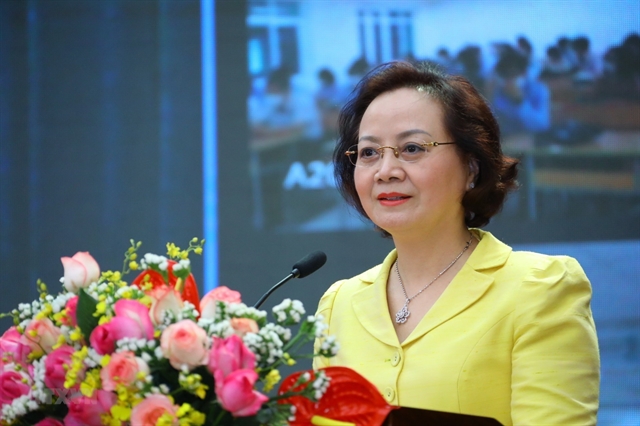 Opinion
Opinion

 |
| Minister of Home Affairs Phạm Thị Thanh Trà. — VNA/VNS Photo |
The recent 8th plenum of the Communist Party of Việt Nam's Central Committee delved into the roadmap for executing the new salary regime, which is a detailed extension of Resolution 27 from the 7th plenum. Minister of Home Affairs Phạm Thị Thanh Trà talks about the matter with Vietnam News Agency reporter.
Could you please explain how this new salary regime will transform the public sector?
Salary policy stands out as a particularly pivotal component of the socio-economic policy system; it serves as a resource and a driving force for the nation's development. The Resolution of the 7th Central Committee seeks to enhance the motivation and work efficiency of our workforce. Implementing salary reform contributes to elevating the quality of work, efficiency, public service ethics, and professional ethics. Simultaneously, it streamlines and bolsters the effectiveness and efficiency of the political system while ensuring stability within the public sector's human resources.
In accordance with the salary policy reform laid out in Resolution No. 27-NQ/TW, the new salary framework for officials, civil servants, public employees, and the armed forces encompasses six core aspects.
The new salary structure is meticulously crafted around job positions, titles, and leadership roles to supplant the current system, which encompasses five distinct salary tables, including one based on position (applicable to officers, civil servants, and public employees in leadership roles, both elected and appointed, across the entire political system, from the central level to communes); one designed for civil servants and public employees who do not hold leadership positions; and three others tailored to meet the needs of the armed forces.
Moreover, the existing allowance frameworks will be reconfigured, guaranteeing a fresh salary structure. This will involve the basic salary accounting for roughly 70 per cent of the total salary budget, while allowances make up the remaining 30 per cent. There will also be an additional bonus fund, equivalent to about 10 per cent of the total annual salary budget (excluding allowances), and the synchronisation of the salary increase system with the issuance of the new salary schedule.
A key element to ensure the feasibility of this reform lies in securing the funding source to put the new salary regime into action.
The final aspect covers salary and income management, which clearly delineates the authority and responsibility of leaders during implementation. It also addresses the application of wage increases and the management of the salary fund.
One can say that never before has a salary policy been constructed with such meticulousness and comprehensiveness, encompassing numerous groundbreaking elements.
Considering the economic challenges and the constraints on implementing salary reform, the Government has twice adjusted the base salary, in 2019 and 2023. These adjustments aimed to alleviate the hardships faced by individuals reliant on salaries and allowances from the State budget. In comparison to 2018, preceding Resolution 27, the base salary in the public sector witnessed a substantial 29.5 per cent increase, surpassing the consumer price index reported by the General Statistics Office and the wage growth rate in the corporate sector was 17.74 per cent.
Can you please elaborate on the timeline for salary regime restructuring in the public sector?
We recommend that a new, synchronised, and unified salary regime be implemented for officials, public employees, and armed forces throughout the entire political system from July 1, 2024, in accordance with Resolution 27.
In the years following 2024, the Government will continue to adjust salary levels in the increased salary tables to offset price fluctuations and make gradual improvements in line with GDP growth until the objectives of Resolution No. 27 are realised.
To execute the provisions of the new salary regime, the Ministry of Finance estimates that significant additional budget expenditure will be necessary for public sector salary reform. It is anticipated that the total additional funding requirement from the budget for the 2024-26 period will amount to nearly VNĐ500 trillion.
Given the substantial funding required for salary reform, there's a pressing concern about the source of funds to support these salary increases. Could you provide insights into this matter?
This is an exceptionally vital issue, and it plays a decisive role in implementing salary reform policy. The resources needed to implement wage policy reform are substantial. Hence, in Resolution 27, the Party Central Committee emphasised the need for "a resolute execution of financial and budgetary solutions, considering this a pivotal task to generate resources for wage policy reform."
Since 2018, ministries and localities have been preparing resources for salary reform. These resources are derived from budget expenditure restructuring within each sector, a 40 per cent increase in central budget revenue (enforced from 2018), and a 70 per cent surge in realised revenue compared to local budget projections to create resources for salary reform (enforced from 2019).
Furthermore, money has been sourced from various avenues, including 10 per cent savings on regular expenses and funds generated through staff streamlining initiatives. Notably, the Ministry of Home Affairs has made considerable strides in perfecting the institutions associated with organisational structure and staff streamlining. To date, the entire political system has reduced its civil servant payroll by nearly 11 per cent and decreased civil servant payrolls paid from the State budget by almost 15 per cent. At the commune level, 49.7 per cent of officials, civil servants, and part-time staff have been cut compared to 2015.
Thanks to the active engagement of the entire political system, we've established a robust organisational structure, reducing nearly 8,000 public service units and streamlining administrative entities from the central to local levels. Notably, administrative units at the district and commune levels have recently downsized their staff significantly. According to data reported by the Ministry of Finance from 2017 to the present, this restructuring and staff reduction have resulted in State budget expenditure savings of nearly VNĐ35 trillion.
Furthermore, despite ongoing economic challenges, the Government, ministries, branches, and localities have tightened their financial belts. To date, the entire nation has set aside VNĐ500 trillion in preparation for salary reform scheduled for the 2024-26 years.
What steps should be taken to address the long-term funding issue, ultimately achieving the goal of setting the minimum salary of officials, civil servants and public employees equal to or higher than the lowest salary in the most developed regions and enterprises, as outlined in Resolution 27?
To ensure a sustainable roadmap for wage reform and the attainment of our set goals, there is a host of immediate and long-term actions required. This entails increasing revenue sources, trimming expenses other than salaries, and concurrently streamlining the organisational structure while optimising staff levels to maintain a balanced budget for salaries.
In addition to following the salary reform roadmap, I believe agencies should continue to boost revenue, economise expenses, and devise fundamental strategies to create resources for salary policy reform. An integral part of this process is the establishment and enhancement of a job classification system, which serves as a foundation for implementing salary policy reform. This involves improving public service institutions and guaranteeing salary disbursement in accordance with leadership roles and job positions.
In the upcoming period, the Ministry of Home Affairs will recommend the continued promotion of an efficient and effective organisational structure, along with the continued restructuring of administrative units at district and commune levels and the arrangement of public service units. Staff streamlining in alignment with the spirit of Resolution 6 from the 6th plenum will also be a key focus.
With the support of the Party Central Committee, the Politburo, the National Assembly, and the diligent preparation of the Government, ministries, branches, and localities, we aspire to secure the necessary resources to embark on wage reform, thereby meeting the expectations of millions of officials, civil servants, public employees, and workers for a sustainable and equitable future. — VNS

.jpg)


